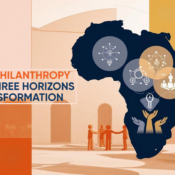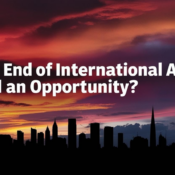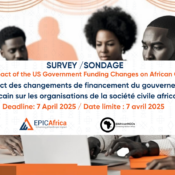Africa stands at the threshold of a transformative era in philanthropy—a time when local ingenuity, deep-rooted giving traditions, and emergent social innovations converge to rewrite the rules. As foreign aid experiences radical curtailment, we return to the powerful call for African-led development that, while not new, demands action now. This call aligns with the changes we are witnessing. It embraces a new form of international development—one that fosters partnerships between those who believe in funding Africa’s homegrown solutions and changemakers and acknowledges that it must be underpinned by a robust infrastructure to knit it all together. To better understand this path to transformation, let us explore a three-horizon framework: optimising our present, nurturing emergent opportunities, and boldly reimagining the future.
Horizon 1: The Present – Harnessing Africa’s Indigenous Philanthropy
Today, Africa’s philanthropic landscape pulses with a rich heritage of collective action. Traditional practices—from the harambee spirit in East Africa, where communities literally “pull together,” to the stokvels in Southern Africa that democratise savings and investment—are not relics of the past, but vibrant engines of resilience and ingenuity. These indigenous models embody the spirit of ubuntu, emphasising interconnectedness and shared responsibility for one another’s welfare.
Yet, even as these traditions thrive, much of Africa’s potential remains stymied by our nascent but under-resourced infrastructure. Nexus organisations, such as national non-governmental organisation (NGO) networks, have limited capacity to truly represent their constituents. Data that can link donors with verified and impactful Civil Society Organisations (CSOs) is lacking or inaccessible. Information, training, or standards that can help CSOs with financial literacy and fundraising lie beyond budgets. Imagine a legal system where lawyers couldn’t access case law, professional networks, or continuing education. Justice would be compromised. Imagine if hospitals operated without a medical association to set standards, with no way to verify licensed doctors, or if new medical techniques and treatments were inaccessible because training was too expensive. Lives would be at stake—yet we accept these gaps in the social sector, where livelihoods and entire communities are on the line.
Optimising the present means capitalising on Africa’s existing strengths while also investing in backbone organisations[1] as a foundation for sustainable social change. This is symbiotic. You can’t have more local impact without resilient local CSOs connected into capacity and knowledge networks. As emphasised in Oak Foundation’s Philanthropy Ecosystem in Africa report, supporting this infrastructure is key to creating more resilient, community-driven change across the continent. By investing in this ecosystem, we optimise the present and safeguard our transition into the next horizon of change.
Horizon 2: The Near Future – Recognising and Nurturing Emergent Opportunities
Across Africa, innovative social enterprises, technology-driven solutions and community finance models are taking root, challenging old systems and redefining what is possible. A fledgling or resource-starved social impact infrastructure cannot keep pace, sustain, or democratise the opportunities needed for a future-fit horizon.
Emergent opportunities are clear in initiatives like M-Pesa, which revolutionised mobile money and is now used by the World Food Programme, GiveDirectly, and many African CSOs; in healthtech innovator LifeBank; or in new digital platforms like our own EPIC-Africa African CSO Platform that connect local donors with grassroots projects. These innovations reflect a shift towards agile, context-specific solutions. In this horizon, local changemakers are carving out spaces where risk-taking and experimentation thrive—a stark departure from past rigidity.
To nurture these emerging opportunities, it is essential to create a supportive ecosystem that allows them the room to establish themselves. This means:
- Allocating flexible, long-term, and localised capital so innovators can pilot, learn, and scale without rigid short-term outcomes.
- Building civil society-led platforms to connect emerging ideas with mentors, investors, and policymakers while sharing critical knowledge openly.
- Fostering cross-sector collaborations where public, private, and civil society partners address complex challenges with creative solutions.
In this near future, global funders must shift into facilitator mode—providing both the capital and the capacity-building support that emerging initiatives require. They must embrace new forms of finance, from pooled funds to flexible finance and mission-aligned impact investing. Here, infrastructure organisations act as honest brokers, whether as trusted intermediaries and regranters or skilled service providers, requiring funders to support them alongside their cause-specific programmes. The seeds of transformation spring forth, setting us up for a prosperous future where funding flows confidently into the continent.
Horizon 3: The Distant Future – Radical Imagination and Transformative Philanthropy
The distant future is never crystal clear but it compels us to radically reimagine the status quo. What if African philanthropy sidestepped the paradoxes or limitations of a Western model and developed its own path? What if local innovation set the gold standard for global development? In this horizon, infrastructure not only enables change but consolidates and amplifies it. Trust-based, decentralised philanthropy combined with purpose-driven enterprise and innovative finance and technology becomes the new norm.
We might imagine a future in which digital platforms and decentralised data repositories allow CSOs to be set up, regulated, managed, and funded with far greater ease:
- AI-Powered Grassroots Governance: What if artificial intelligence empowered even the smallest community organisations to track impact, manage finances, and access legal frameworks without costly intermediaries? With AI-driven translation, any African language could become the default in governance and collaboration, ensuring no one is left behind.
- Pan-African Social Impact Marketplace: Picture a regional marketplace where social enterprises and CSOs trade services, share resources, and access innovative financing. Through a decentralised, digital marketplace, African-led solutions could scale rapidly, connecting directly with global capital and expertise without external gatekeepers.
- Trust Networks and Reputation Protocols: Envision a blockchain-based reputation system where communities can endorse CSOs based on lived experience and tangible impact. This trust protocol would allow funding to flow directly to the most effective organisations, bypassing bureaucratic bottlenecks.
These are just some examples of a leapfrog effect. Yet none of these innovations will emerge or scale in a vacuum. Infrastructure organisations are the connective tissue that bridge vision with execution. They convene across sectors to fast-track innovations, translating bold ideas into actionable pathways. By linking appropriate capital with bold innovations, they de-risk new approaches and unlock possibilities. Their interventions don’t just accelerate progress—they make it viable. Without them, innovation is too costly, knowledge remains fragmented, and under-resourced organisations bear the burden of failure.
In this envisioned future, infrastructure organisations are essential—the engine that powers a self-sustaining, thriving civil society. Funders and local changemakers are liberated from power imbalances. Practical steps such as co-designed funding strategies, multi-year unrestricted grants, shared governance models, collective intelligence, and collaboration have led to transformation at pace.
The visionary framework of Agenda 2063—Africa’s blueprint for achieving political, economic, and social integration—provides an inspirational backdrop for this change. It calls for an Africa that is self-reliant, innovative, and globally influential. In Horizon 3, African philanthropy will serve as both a model and a catalyst for a new era of international development, one where the innovations born from Africa not only solve local problems but offer valuable lessons for the world.
This article was first published on Alliance Magazine.



